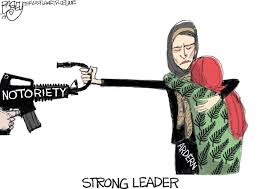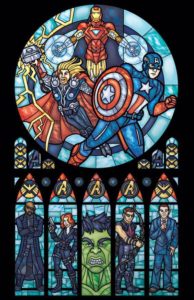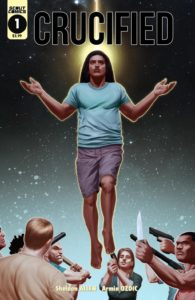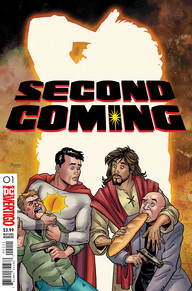
https://www.sltrib.com/opinion/bagley/2019/03/19/bagley-cartoon-strong/
(Thank you to Marc Singer, author of the new Breaking the Frames: Populism and Prestige in Comics Studies, for bringing this to Sacred and Sequential‘s attention.)
Editors: Jennifer Baldwin and Daniel White Hodge
 Marveling Religion: Critical Discourse of the Marvel Cinematic Universe is an edited volume with interest in contracting and publishing from Lexington Books. It aims to explore central themes of race, gender, religion, politics, society, love, time, space, power, soul, reality, or mind, etc. as expressed (or neglected) in phases 1-3 of the Marvel Cinematic Universe. Ultimately, the invitation is: As religious and/or theological scholars, what do our perspectives contribute to popular discourse on the MCU?
Marveling Religion: Critical Discourse of the Marvel Cinematic Universe is an edited volume with interest in contracting and publishing from Lexington Books. It aims to explore central themes of race, gender, religion, politics, society, love, time, space, power, soul, reality, or mind, etc. as expressed (or neglected) in phases 1-3 of the Marvel Cinematic Universe. Ultimately, the invitation is: As religious and/or theological scholars, what do our perspectives contribute to popular discourse on the MCU?
What shall we say about the snap—or any other fascinating dimension of the MCU? How might aspects of intersectionality be at work in the MCU? How does one define evil and good via the MCU?
Continue reading CFP – Marveling Religion: Critical Discourse and the Marvel Cinematic Universe
 In case you missed it, Second Coming, the series from Mark Russell and Richard Pace, was canceled by DC Comics for its Vertigo line after an outcry (like this one) amassed online for its “blasphemous content.” DC reverted the rights back to Russell and Pace to have it published elsewhere.
In case you missed it, Second Coming, the series from Mark Russell and Richard Pace, was canceled by DC Comics for its Vertigo line after an outcry (like this one) amassed online for its “blasphemous content.” DC reverted the rights back to Russell and Pace to have it published elsewhere.
Meanwhile, Scout Comics has plans to release Crucified this year, and, late this month, Image Comics will release Jesusfreak featuring the Christian Messiah as “a kung fu demon slayer.” Fox & Friends does not like that he beheads his enemies in his mission, reports Newsweek.
This is to say nothing, of course, of Zombie Jesus, Jesus Hates Zombies, Jesus as an alien in Martian Comics, Jesus Christ: In the Name of the Gun, or fan-favorite Battle Pope (with sidekick Jesus).
Of course, every so often, we are treated to a Punk Rock Jesus, so one cannot be too quick to judge the latest wave of irreligious Jesus comics…
DC Comics and Florida publisher square off on who Jesus is —

LEESBURG, FL January 11, 2019 – The battle between David and Goliath went into extra rounds among the faithful this week when DC Comics made a jolting announcement regarding a upcoming new series on Jesus Christ. In “Second Coming,” the writer Mark Russell previously explained that the series centers on the fact that God “was so upset with Jesus’ performance the first time he came to earth since he was arrested so soon and crucified shortly after, that he has kept him locked up since then.”
Art Ayris is the publisher of Kingstone Comics, a small central Florida publisher, but still the largest Christian comics publisher worldwide with their comics in over 30 languages. Kingstone published the most complete graphic adaptation of the life of Christ ever done, contained in their graphic novel trilogy The Kingstone Bible. The tome was a finalist in the Evangelical Christian Publishers Association 2017 Book of the Year awards. The graphic Bible is not only the most complete graphic adaptation of the Bible ever done but is also the largest non-serialized graphic novel ever published. With his feet in both the world of comics and the religion the comics publisher had a few thoughts on the new take on Jesus Christ.

“We are all for responsible fiction, but dissing the deity of Jesus Christ and his monumental sacrifice for our sins is a tough pill to swallow. I sure hope they (DC) will reconsider this blatant move. The even fictional concept that Jesus is sent on a mission by God to learn what it takes to be the true messiah of mankind from the all-powerful superhero Sun-Man, the Last Son of Krispex, is a blasphemous joke. I can understand why (former Campus Crusade President) Bill Bright offered 10 million dollars to Universal Studios to purchase the film negative of The Last Temptation of Christ.” Continue reading Kingstone Asks: WILL THE REAL JESUS PLEASE STAND UP?

Following its coverage at Fanboy Planet, the new trade paperback Kismet, Man of Fate – Volume 1: Boston Strong has received some impressively thorough coverage from Aysha Khan at the Religion News Service.
Lewis rattled off a list of common tropes about Muslim characters he hoped to avoid with his character: the “noble savage” who is uncorrupted by modern civilization; the mystical Muslim superhero; the docile Muslim woman; the perishable “cannon fodder”; and, more broadly, Muslim characters being carelessly boiled down to a nebulous racial and religious mass.
For Lewis, writing a Muslim superhero was also an opportunity to address the connection between superhuman ability and cosmology. Do the powers to, say, fly or manipulate fire come from God?
It will be exciting to see if this leads to greater discussion about religion in comics, the superhero genre specifically. Can there be a secular narrative on a character who credits his abilities to some aspect of divinity?
(And, normally, we would warn “don’t read the Comments,” but there may be something informative to them at RNS, potentially.)
First Muslim superhero returns after 70 years, just in time to take down a few Nazis